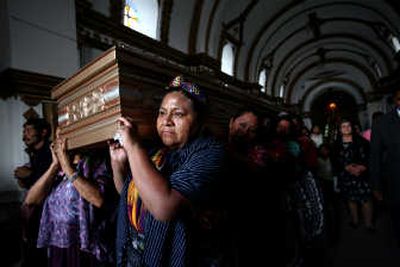Prelude to Guatemala election bloody

SAN RAYMUNDO, Guatemala – At the slippery base of a steep, muddy path, Armando Sanchez, a thickset man with dark bags beneath heavily lidded eyes, slumped in a plastic chair and sobbed.
Before him in the candlelit gloom of a cinder-block hut lay a coffin holding the bullet-riddled body of Esmeralda Uyun Sican. Until a few hours earlier, the 23-year-old Mayan Indian, whose mother quietly cried outside, had been running for a council seat in this highland village north of Guatemala City.
“So young, so young,” Sanchez muttered to himself.
Sanchez, a candidate for Guatemala’s Congress, was attending his seventh funeral in six months, each grim gathering a farewell to a candidate or political worker struck down by bullets in the astoundingly violent run-up to today’s national elections. At least 50 candidates and political activists representing parties across the political spectrum have been slain in the past 15 months, and dozens of others have been attacked, according to watchdog groups.
Political workers have been hacked with machetes; candidates have been bombed, shot and beaten. Even though Guatemala is one of the world’s most violent countries, the brazen nature of the killings has surpassed anything seen here since three decades of civil war ended in 1996.
“This is not a campaign, this is a war,” said Erasmo Ordonez, whose uncle was killed in May while running for mayor in the town of Zacapa and whose political activist father was murdered two years earlier.
The roots of the pre-election violence are the subject of much debate among the 29,300 candidates and 21 political parties vying for offices in nearly every Guatemalan village, city and state, known here as departments. Some blame the drug cartels that are believed to have penetrated almost all levels of Guatemalan government; some say the killings are ordered by political rivals. Others argue that the pace of murders is far from abnormal in a country of 12 million people that registered at least 6,000 murders last year. And yet others believe some of the violence may be the fault of the informal syndicates that govern many walks of life, threatening violence if they do not receive payoffs for everything from bus routes to milk deliveries.
Whatever the case, the violence has boosted the presidential campaign of Otto Perez Molina, a retired Guatemalan army general and military intelligence chief whose campaign posters, featuring a clenched fist, leave little doubt about his stance on crime. Once trailing badly, he has surged ahead and is now tied with the longtime front-runner, Alvaro Colom, according to a poll released Wednesday by the newspaper Prensa Libre.
Perez Molina, of the Patriot Party, insists he will respect human rights if he is elected. But he also has told reporters that he will not hesitate to impose martial law, suspending rights to free assembly and movement, for limited periods in parts of the country plagued by violent drug cartels. His campaign’s slogan, “mano dura,” which translates as strong hand or iron fist, has often been associated here with repressive military governments.
“We’re saying the truth about what is happening in this country,” Perez Molina said in an interview in Guatemala City. “If we don’t have a strong state, if we don’t have a government that is willing to confront these problems, Guatemala is at risk of becoming a failed state or converting into a narco-state.”
Perez Molina’s opponents – all 13 of them – have been slow to respond to his improved standing. During a campaign nearly free of personal attacks, several candidates have complained that Guatemala is in danger of returning to its militarized past and have mocked the “mano dura” slogan, but they have seldom mentioned Perez Molina by name.
Guatemala’s government and some international observers have said it’s impossible to know whether the killings now dominating the campaign are linked to politics.
Diego Garcia-Sayan, chief of the Organization of American States mission that is monitoring the elections, said in an interview that preliminary Guatemalan law enforcement reports show no “pattern” to the killings of political workers and candidates.